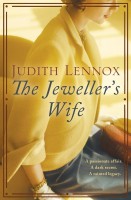Discovering The Jeweller’s Wife
During the course of writing a book, I get to know my heroine. I find out about her. The jeweller’s wife is Juliet Winterton, and she is the central character of my latest novel, which will be published in paperback this September. Although there are other important female characters in the novel, Juliet is the pivot, everything else revolves around her. It is her happiness and sorrow, choices and dilemmas that the reader cares about.
A heroine must be likeable, so that the reader wants to stay with her, and yet she must also be flawed, because if she was flawless she would be breathtakingly dull. I have more leeway with my minor characters. You have to dig deep with your heroine.
 ‘The Jeweller’s Wife’ opens in 1938. The newly-married Juliet Winterton is then a mixture of innocence and experience. She is ignorant of the things a middle-class wife ought to know – how to manage the servants, how to order new clothes from a Parisian couturier. Instinctively, she knows that her experiences – of rootlessness, of living hand-to-mouth, of taking a lover – would be considered unacceptable by the Winterton family. She must hide them. A habit of secretiveness is formed, which stays with her.
‘The Jeweller’s Wife’ opens in 1938. The newly-married Juliet Winterton is then a mixture of innocence and experience. She is ignorant of the things a middle-class wife ought to know – how to manage the servants, how to order new clothes from a Parisian couturier. Instinctively, she knows that her experiences – of rootlessness, of living hand-to-mouth, of taking a lover – would be considered unacceptable by the Winterton family. She must hide them. A habit of secretiveness is formed, which stays with her.
Juliet has spent her formative years in the Middle East, the companion of her father, an academic. She has moved from country to country and has never known a real home. To get by in the conventional milieu of late 1930s England, she must make herself into something new. After a restless, wandering upbringing, she has at Marsh Court found a home.
Although she is part of the Winterton family in name, it takes her a long time to feel accepted. She looks English – she is slender, with dark gold hair and an English rose complexion – but has the wariness and carefulness of an outsider. Like any foreigner in a strange land, she tries to learn the rules and customs of the country in which she finds herself. Like all families, the Wintertons inhabit their own closed, private world. They have their games, their photo albums, their history and memories, that Juliet does not share.
Juliet’s veneer of compliance and restraint disguises a deep well of passion and a longing to love and be loved. Her own nature almost undoes her. Within a few months of marriage to Henry Winterton, she finds herself deeply attracted to his friend, Gillis Sinclair. Critical, cynical Henry, who married her for her youth and beauty, writes her off as credulous and stupid, but Henry consistently underestimates and misunderstands her. Juliet’s gentleness coexists with a fierce protectiveness and the strength to survive. Henry, who has always had a home and family life, and who can afford to be contemptuous of the latter, is incapable of imagining what it is to be without either.
At the heart of ‘The Jeweller’s Wife’ is Juliet and Henry’s marriage. In ‘Before The Storm’, I portrayed a difficult marriage. But the Wintertons have a bad marriage, irretrievably bad, which turns sour almost before the honeymoon is over. Henry Winterton is a man who likes to provoke for the sake of it, who thrives on drama and provokes conflict because he gets a kick out of it. He takes pleasure in making even his closest friends and family feel angry and humiliated. He humiliates Juliet in front of the staff of his Bond Street jewellery shop. ‘Why is it that the only Winterton she had not come to love was her husband,’ Juliet wonders.
I wanted to explore how you might survive when locked in a relationship that founders so quickly – and how you might endure (if that’s your choice) and find consolation and a future. And what such a marriage does to you, how it can both undermine and make you stronger at the same time.
Juliet learns to adapt to her new country, new home and new family. During the Second World War, Henry joins the army and Juliet finds herself on her own with her infant son at Marsh Court. She learns new skills and discovers in herself new resources and learns to trust in her own decisions. At this stage of the novel, she is still hopeful that her marriage will improve. But events take an unexpected turn and she finds herself caught up in a deception of someone else’s making.
By the end of the novel, Juliet Winterton is a sophisticated, competent woman. The ingénue who was cowed by the snooty Parisian couturier is gone, and she copes alone with difficult and sometimes frightening challenges. And she finds love at last, in an unexpected place.
I love the cover my publishers, Headline, have chosen for ‘The Jeweller’s Wife’. It shows an elegant, understated women – and yet the dominant colour is a bright, sunny yellow that sums up, I think, the feeling of optimism that Juliet has earned by the end of the book.